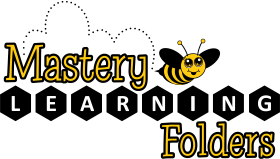Research
Hello, I’m Nicola Carr-White, a Masters by Research graduate (Education), a registered primary school teacher and the founder of Mastery Learning Group. If you're a teacher, it will be obvious to you that students need much more practise time than can be achieved within the lesson context. Add to that, the complicating factor of individual abilities and achievement!
My degree investigated the results of cognitive psychology research1–spaced, retrieval, interleaved practice, and metacognition factors–to apply them to a tool known as a Mastery Learning Folder designed to support the practise of classroom learning. The tool process now includes the most effective spaced intervals–adaptive2 and expanding3,4 for durable learning,5 and the optimum number of retrievals for short and long term retention6. These strategies combine to create the desirable difficulty that facilitates learning in long-term memory7. My results were examined by Drs Robert Bjork (Desirable Difficulties theorist), John Hattie (Visible Learning) and John Sweller (Cognitive Load Theory).
Additionally, a practical classroom implementation strategy was developed which places the teacher in a management role and divides the remaining workload between the available human resources, such as parents, education assistants and student leaders.
Schools and teachers interested in exploring how Mastery Learning Folders can assist them to meet differentiated learning needs through tailored practise are invited to request on-site or virtual professional learning.
Video presentations of my research from the 2022 Dyslexia-Speld Conference and Research Ed Conference can be accessed below.
With kind regards,
Nicola
References
1. Dunlosky, J., Rawson, K. A., Marsh, E. J., Nathan, M. J., & Willingham, D. T. (2013). Improving students’ learning with effective learning techniques: Promising directions from cognitive and educational psychology. Psychological Science in the Public Interest, 14(1), 4-58.
2. Mettler, E., Massey, C. M., & Kellman, P. J. (2016). A comparison of adaptive and fixed schedules of practice. Journal of Experimental Psychology: General, 145(7), 897-917. https://doi.org/10.1037/xge0000170
3. Kang, S., Lindsey, R., Mozer, M., & Pashler, H. (2014). Retrieval practice over the long term: Should spacing be expanding or equal-interval? Psychonomic Bulletin & Review, 21(6), 1544-1550. https://doi.org/10.3758/s13423-014-0636-z
4. Küpper-Tetzel, C. E., Kapler, I. V., & Wiseheart, M. (2014). Contracting, equal, and expanding learning schedules: The optimal distribution of learning sessions depends on retention interval. Memory & Cognition, 42(5), 729-741. https://doi.org/10.3758/s13421-014-0394-1
5. Cepeda, N. J., Vul, E., Rohrer, D., Wixted, J. T., & Pashler, H. (2008). Spacing effects in learning: A temporal ridgeline of optimal retention. Psychological Science in the Public Interest, 19(11), 1095-1102. https://doi.org/10.1111/j.1467- 9280.2008.02209.x
6. Rawson, K., & Dunlosky, J. (2011). Optimizing schedules of retrieval practice for durable and efficient learning: How much is enough? Journal of Experimental Psychology: General, 140, 283- 302. https://doi.org/10.1037/a0023956
7. Bjork, R. A., & Bjork, E. L. (2020). Desirable difficulties in theory and practice. Journal of Applied Research in Memory and Cognition, 9(4), 475-479.
Research MEd Results

“If you repeat the same thought-demanding task again and again, it will eventually become automatic: your brain will change so that you can complete the task without thinking about it.” (Willingham, 2009,p. 8)
